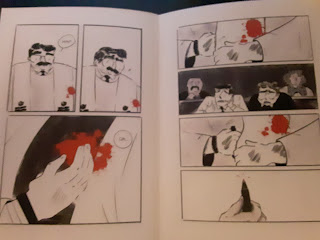Mac Maclean's comics have revolved around their father, who died in 2017. The three comics they presented here are part of their thesis, titled Now I Can Get A Word In. It's a funny and bittersweet title by a young artist who's trying to figure out both their relationship with their father as well as their own shifting identity as a trans person. The minis are part of this larger puzzle, yet each one is distinctly packaged and serves as its own unique entity.
In The Stain, for example, Maclean quickly established that their father was a minister who died in 2017. I'm pegging this as either an intro chapter or something very close to that, because Maclean established their dad's personality as well as aspects of their dynamic with an incredible sight gag. As Maclean and their brother fidgeted as their father delivered a sermon, their brother noticed a growing red stain developing on his white vestment laid on his chest. The congregation started to panic until their brother yelled at his dad, and he pulled out a red, felt-tipped marker that he had left uncapped in his pocket. It was a great joke, but it also added foreshadowing to the sense his dad had that he wasn't going to live a long life. It was part of the indecipherable enigma that their dad presented.
Suit was about outward presentation. It started with the suit they buried their father in, the suit he wore all the time in his role as professor and pastor. There's a great page where Maclean has an imaginary action figure of their dad in a box labeled "G.I. DAD." The suit was a uniform; uncomfortable, but it looked good and projected the image he wanted. Maclean details each part of the uniform and then recalls the suit they wore to a wedding, wondering about feeling comfortable not just in a suit, but in their own body. All along, they confessed to wanting more from him, More intimacy. Being more present.
Maybe He Did further touched on his enigmatic qualities, as it focused on times in his life where he nearly died and tried to hide it as much as possible from his children. When Maclean was at college, their brother had to call them to tell them to let them know that their father was getting heart surgery. In the end, Maclean asked: did he know he was going to die? Their brother said he hadn't been feeling well, but he preferred to do nothing than bother anyone else about it. It's another case of their father very deliberately keeping others out with a smile and a bit of dismissiveness and a great deal of secrecy. In response, Maclean's narrative is all about wanting little more than being let in.
One of the big reasons why it works is the careful use of grayscale and spot color in creating atmosphere, tone, and weight. That is all secondary to the real achievement: Maclean's choices in character design and their use of gesture. The exaggerated, cartoony, and outsized character design for both their father and themselves is almost comical-looking; it's a funny shape, and their father's glasses and mustache are equally funny. It's part of the aesthetic. At the same time, the use of body language and gesture is exquisite and frequently devastating, like Maclean squeezing their eyes in grief, sadness, and frustration when hearing their dad was going to be in surgery. This is all a highly promising beginning for the memoir, and I imagine the finished product will be excellent.







No comments:
Post a Comment